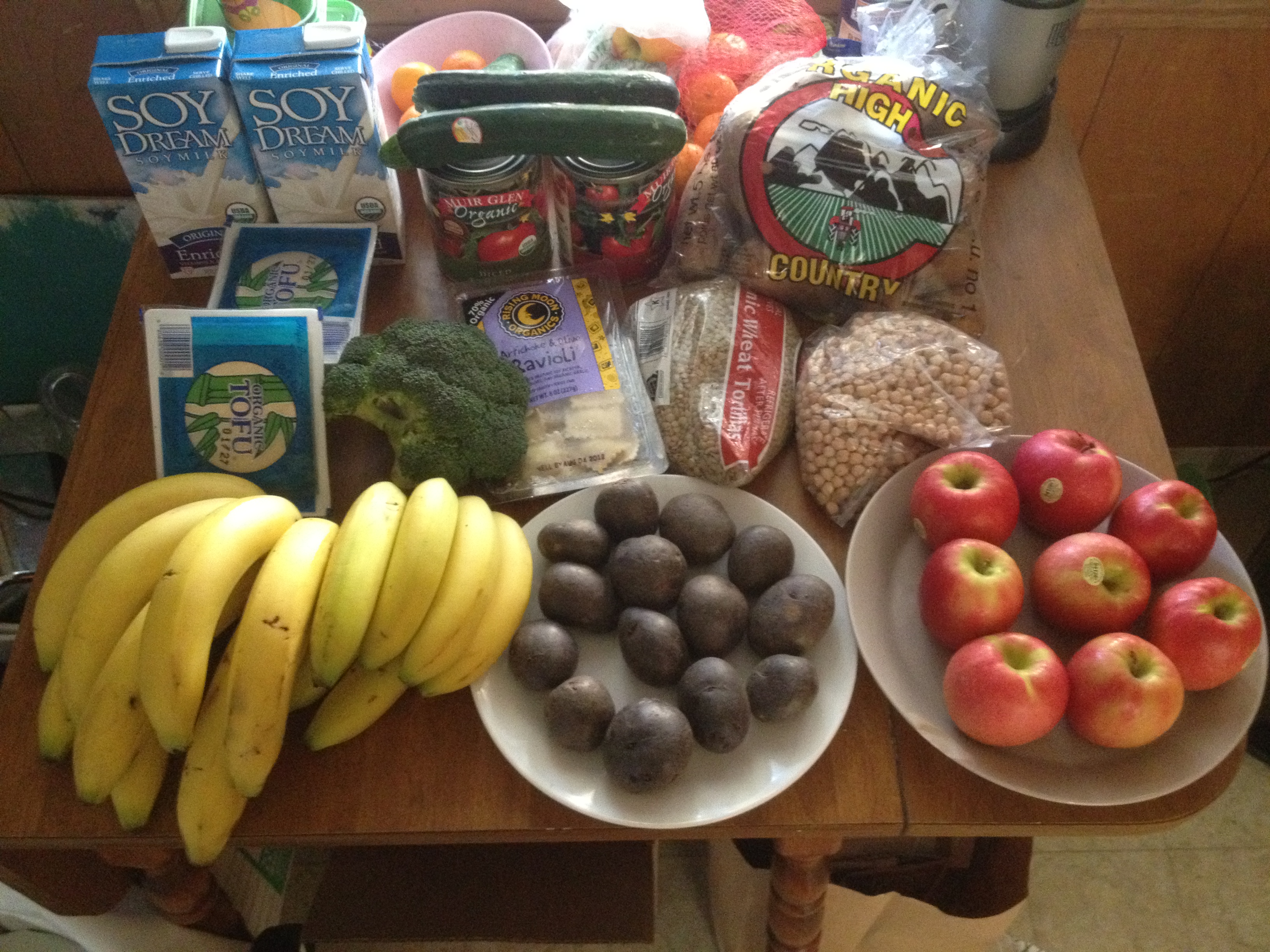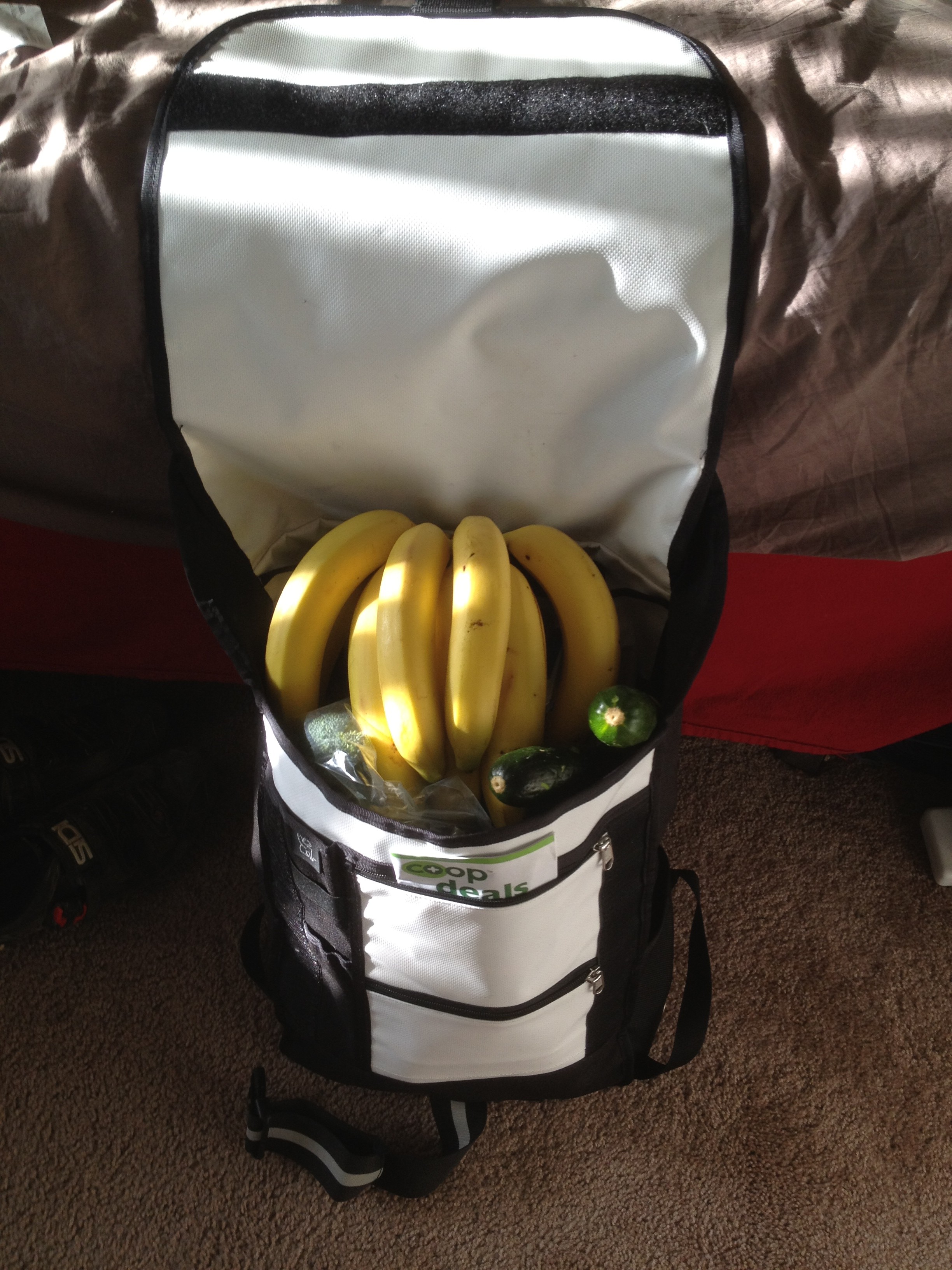“But what do YOU buy?’
A question I often hear. And a difficult one to answer! Like most people, I go through phases with what I feel like cooking and eating and that affects my shopping. While I eat strictly vegan, I am not as strict with local and organic, but I often will pay a little extra for these. I balance it by saving money by soaking and cooking my own beans and preparing as many foods as possible from scratch. I’m not as awesomely cheap at my good friend Steevo who survives as an elite road racer on mostly oats and peanut butter and makes his own bagels, but I am frugal. AND I eat great, healthy food. For the first time in my life I’m walking distance from a member-owned organic vegetarian co-op and it’s expanding my usual food purchasing. Here’s my recent score:
Now this is not all I eat, as it doesn’t include staples like peanut butter, rice, tortillas nor as many vegetables as I eat, but I wanted to share what $42 can get you at an organic co-op:
1.5 pounds garbanzo beans
1.5 pounds lentils
5.5 pounds bananas
2 pounds purple potatoes
0.75 pounds broccoli
0.2 pounds garlic
2 pounds tofu
1/2 gallon soymilk
5 pounds russet potatoes
2.5 pounds pink lady apples
1 pound zucchini
3 pounds canned tomatoes
8 ounces vegan ravioli (It was on sale!)
And fortunately over 25 pounds of food fits inside my messenger bag:
Combined with my staples, this is many days worth of food, without that much labor (the garbanzo beans are cooking while I write this- multitasking!). What does your shopping cart or messenger bag look like? And have you seen these articles from the past few days?
–Jonathan Safran Foer: environmentalists who eat meat have a blind-spot
–Cook County (Chicago) Health Department: become a vegetarian!
–FBI tracking videotapers as terrorists?
–Should you go vegan to get skinny? by Ginny Messina, RD, MPH
I’m also working on a post about New Year’s Resolutions, should be up before the end of the week. Oh yeah, happy new year!


I use last year’s version of this, which I love: http://www.rei.com/product/827130/rei-traverse-30-pack. For smaller trips I use an earlier version of this, which holds a surprising amount and is very light on its own: http://www.rei.com/product/827135/rei-stoke-19-pack. I usually keep a reusable tote or two stuffed in the water-bottle pockets so I have more room if I get bulky things or stuff I don’t want to squish.
You seem like a nice guy but I can’t believe how uninformed you are. Do you even bother to read outside of the Vegan dogma? Since you offer nutritional advice to other people you sort of owe it to them to do so.
We can all agree that eating factory farmed animals is not good for the environment or your health. But grass fed beef and other well treated animals that range free and are fed natural diets create good healthy meat for us humans. We evolved eating meat, cooked meat helped our grains evovle and grow, giving ancient humans an evolutionary advantage ~ BBC Documentary on it ~ http://ow.ly/8yE97
This idea that Vegan or Vegetarianism is somehow a bloodless endeavor is simply not true. In fact, this research from Australia basically affirms what ex-vegan Lierre Keith says in her book “The Vegetarian Myth”. Which I’m sure you haven’t read… That producing wheat and other grains results in: at least 25 times more sentient animals being killed per kilogram of useable protein, more environmental damage, and a great deal more animal cruelty than does farming red meat. http://ow.ly/8yDR9
I’m just going to go out on a limb here and guess that you espouse the China Study as “proof!”. Well some intelligent people have analyzed the raw data from that book. 1st Campbell makes all his claims based on the dairy protein casein. Which is supposed to somehow represent all animal meat on earth, nonsense. Second he cherry picks the data to agree with his hypothesis. I could go on but I challenge you to read this entire critique by Denise Minger (she’s a brilliant ex-vegan) ~ http://ow.ly/8yDMk
I am always surprised how Vegan-ism is treated more like a religion than most religions I know. More than any other group interested in nutrition they are the least interested in really understanding the issues, because that means reading both sides.
Chris,
Yawn. I’ve read Lierre Kieth’s book; I’m familiar with her unscientific, philosophical rants. And I’ll reason with you: I know that living in modern society with large-scale agriculture is not bloodless. But as Kieth’s pal Derrick Jensen says, it is not zero sum. We all have some impact on the earth; the goal is to reduce it, not eliminate it. This idea that we should kill animals to save animals is not only ludicrous, but has been refuted by real science. That data out of Australia does not extrapolate. And Ginny Messina has already taken the nutrition myths in Kieth’s book to task with real science: http://www.theveganrd.com/2010/09/review-of-the-vegetarian-myth.html
Lastly, I’m familiar with Campbell’s work and while I think it has validity I personally don’t draw such strong conclusions. For longevity and protection from chronic diseases I look to the Adventist Health Study, the Harvard Nurses Study and the Position Paper on Vegetarian Diets from the Academy of Nutrition and Dietetics. All the science is there for you to peruse, if you’d like.
Best,
Matt
for those of us with limited budgets could you estimate how many meals that $42 worth of food would last you?
It’s hard to say exactly because I’m constantly shopping and cooking and adding up the price of one meal is difficult. BUT I generally live on less than $5 a day, excluding the occasional meal out. So if I had to answer you: 8. 🙂
That’s 8 days, not 8 meals!
On Thu, Feb 2, 2012 at 11:03 PM, Matt Ruscigno wrote:
> It’s hard to say exactly because I’m constantly shopping and cooking and > adding up the price of one meal is difficult. BUT I generally live on less > than $5 a day, excluding the occasional meal out. > So if I had to answer you: 8. > 🙂 > >
Really enjoyed this post, and I would love to see a post on ‘what’s in your fridge/pantry’ (or a video, that would be cool)
Thanks! I’m trying to post more recipes and cooking topics…the main problem is that I don’t measure anything! Ha.
Loved reading this post and seeing the pictures. I think sometimes the best way to share an idea is to show pictures that make it “real” for the reader. And as a dietitian, you’re in the perfect position to show how the nutrition science translates into the shopping bag. Thanks, Matt!
Great info. Lucky me I ran across your blog by chance (stumbleupon). I’ve book marked it for later!